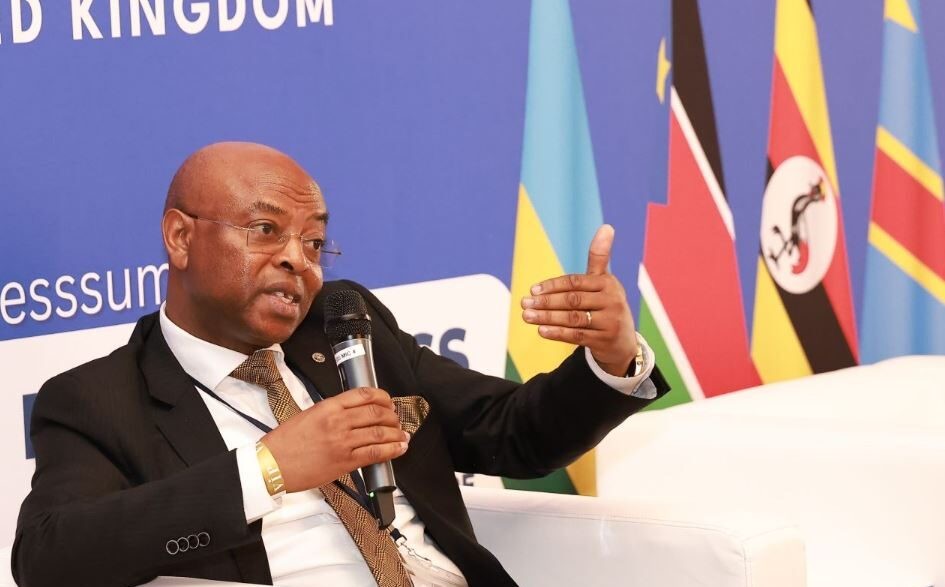KAMPALA, November 11, 2025 – Uganda’s Central Bank, the Bank of Uganda [BoU] has identified the high cost of digital transactions as one of the major obstacles to achieving full financial inclusion in the country.
According to BoU Deputy Governor, Prof Augustine Nuwagaba, the cost of transferring money across various digital platforms continues to hinder the widespread adoption of digital payments and currency in Uganda.
Speaking at the Annual Financial Inclusion Forum 2025 held last week at Sheraton Kampala Hotel, Nuwagaba noted that some African economies, such as Somalia, have achieved unexpectedly high levels of financial inclusion, so much so that even street beggars use their mobile phones to receive contributions.
“In Somalia, they don’t use physical cash as we do. No one carries money. The country operates almost entirely on digital currency. There are only two countries in the world whose currencies are fully digital—Somalia, and the Netherlands. Even beggars in Somalia ask for help using a phone, or at least have their phone numbers written on their hands. That is the level of digitisation and inclusion we are talking about,” Prof Nuwagaba said.
The Bank of Uganda Integrated Annual Report, released in June 2025, revealed that the Bank spent Shs 193.757 billion on printing new banknotes in 2025, an increase from Shs 174.209 billion in 2024. The cost of minting coins was Shs 9.803 billion, compared to Shs 13.299 billion the previous year.
Nuwagaba urged commercial banks to focus not only on the supply side of financial products but also on consumer usability.
“Most commercial banks have been focusing on the supply side, but we must also consider the demand side. Can customers use your product? Is it practical? Digitalisation remains very costly, especially for commercial transactions,” he noted.
According to World Bank data, Uganda has made significant progress in financial inclusion. The Findex Report released in January 2025 shows that 73 percent of Ugandans now have an account with a financial institution, up sharply from 23 percent in 2013.
“Over the past two decades, Uganda has made tremendous progress on its financial inclusion journey. The most recent data from the World Bank Findex Report 2025 indicate that, 73 percent of adults have an account with either a financial institution or with a mobile money service provider, up from 66 percent in 2021. We have seen the transformative power of mobile money, the spread of SACCOs, agency banking, targeted government programmes such as the Parish Development Model , and Emyoga all anchored on an enabling legal and regulatory environment. These milestones have opened doors for millions of Ugandans, who are now part of the money economy. That said, we also know that progress must be measured not only by access, but also by usage, quality, and impact,” he said.
Meanwhile, Nuwagaba urged religious leaders to discourage teachings that portray the pursuit of wealth as ungodly, arguing that the Bible contains more than 2,500 verses related to money.
“Out of the Bible’s 31,102 verses across 66 books, about 2,520 talk about money, roughly a quarter of the entire text. So, we should reject teachings that discourage work and economic activity. The Bible itself says, ‘If you do not work, you should not eat.’ Let us encourage people to participate actively in the financial sector,” he said, to the amusement of the audience.
At the same event, Finance Minister Matia Kasaija highlighted Uganda’s progress in advancing financial inclusion through government wealth creation programmes, including the Parish Development Model [PDM], and Emyooga programme.
“Through the PDM financial inclusion pillar, Shs 3.261 trillion has been disbursed to PDM SACCOs, directly impacting over 3.26 million beneficiaries. Similarly, the Emyooga programme, through the Microfinance Support Centre, has disbursed Shs 308.6 billion to 7,008 SACCOs, benefiting more than 773,000 individuals,” he said.
Held under the theme “Access to Usage: Advancing Inclusive Financial Product Uptake in Uganda,” the forum provided a platform for stakeholders to discuss strategies to expand access to and usage of formal financial services.
Digital transactions in Uganda mainly comprise mobile money, which remains the dominant channel, alongside bank transfers, debit and credit card payments, digital wallets, and online payment systems offered by fintech platforms.
https://thecooperator.news/ucscu-refutes-reports-on-sacco-registration-with-bank-of-uganda/
Buy your copy of thecooperator magazine from one of our country-wide vending points or an e-copy on emag.thecooperator.news
